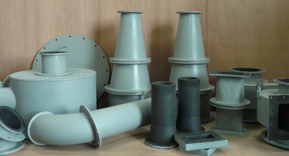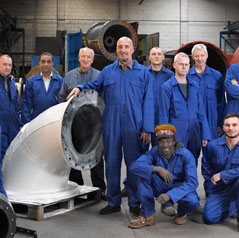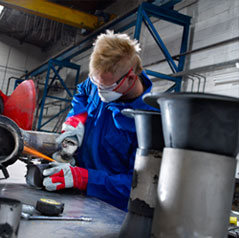Many of the industries served by Applied Rubber Linings are listed below.
A brief overview has been supplied; please click on headings below to expand and review, however if further, more detailed information is required please contact us.
Show AllMining and Quarrying (including sand, aggregates and dredging)
The extraction and processing of sand, aggregates and minerals presents many challenges for the engineers and designers responsible for the effective operation of the plant and equipment used in these industries. They have to contend with abrasion and wear, corrosion and chemical attack, and high levels of noise in very aggressive process environments. Rubber Linings are used extensively within these industries to combat all of these issues and to extend plant life.

Rubber lined sand washing plant
Water and Effluent Treatment
There are many different uses for rubber linings within the water cycle, including chemical and corrosion resistant linings for water and effluent treatment plants, non-conductive rubber linings for insulating electromagnetic flow meters, and water industry approved linings for contact with potable ( drinking ) water. Applied Rubber Linings works with manufacturers and users of water treatment plant, and with water authorities, to provide durable, cost effective linings and coatings for all these applications.
Waste Treatment, Reclamation and Recycling
The reclamation and recycling of materials from domestic and industrial waste has been a rapidly expanding industry in recent years, and rubber lining has it’s uses and benefits within these activities. Ranging from wear resistant rubber linings for sand washing plant (reclaiming sand from building rubble), wear resistant pipe linings (reclaiming ash and dust from industrial processes, to be used in making building blocks), or noise reducing linings for chutes and hoppers (for metal recovery and recycling plants); Applied Rubber Linings continue to seek out new applications for rubber lining within this growing industry.
Chemicals (processing, storing and transporting of chemicals, acids and dyes)
The chemical industry was one of the first big users of rubber lined process plant, as rubber linings are highly resistant to most acids and chemicals. Rubber lined mild steel offers a robust, durable and cost effective option for the manufacture of process vessels, storage tanks, road tankers, pipe work, valves, pumps, filters, centrifuges and mixers, all used within the chemical industry.
Power Generation
Most power stations will burn fuel to produce steam to drive the turbines that generate the electricity, and most of these power stations will have a water treatment plant. The water treatment plant will often be rubber lined (rubber lined vessels and rubber lined pipes). Chemical storage and chemical dosing tanks within the water treatment plant may also be rubber lined; and other uses for rubber lining within power stations might include rubber lined cooling pipes, and rubber lined or coated items for coal handling, ash recovery, and fume scrubbing.
Metal Finishing (including electroplating, anodising, pickling, vibratory finishing and shot blasting)
Rubber linings in electroplating tanks provide the dual benefit of protecting the steel tank from corrosion by the plating solution and of insulating the tank so that the electroplated coating does not build up on the tank walls instead of on the work. Anodising tanks and pickling tanks are commonly rubber lined to protect the tanks from corrosion; and vibratory finishing (deburring) machines are lined with abrasion resistant rubber to protect the machine from being worn away by the finishing process. Similarly shot blasting rooms, cabinets, and shot recovery plant can all be rubber lined to prevent the shot blasting process from abrading the actual plant itself.
Materials Handling
Materials handling equipment can include hoppers, chutes, mixers, separators, lifting hooks and buckets, clamps and grabs, conveyor belts, and so on. Items of materials handling equipment might be rubber lined or coated to protect the equipment from wear or corrosion, to reduce noise within the process, and/or to protect the product from damage by the handling equipment.
Oil and Gas
The oil and gas industry are users of rubber linings, from rubber coated riser pipes on North Sea oil rigs to protect the steel pipes from corrosion by sea water, to rubber lined process plant in the manufacture of chemicals and other by products from the oil and gas refining processes.
Food and Beverages (including brewing)
Food quality and potable water approved rubber linings are available for protecting plant and equipment in the food and beverage industry and are used in the production of sweets and confectionary, beer and soft drinks, stocks and flavourings, and food dyes. The rubber linings are also for protection of the product; for instance we have lined steel coating pans with a white food quality soft natural rubber to protect sweets from cracking and chipping during the sugar coating process. The food quality linings are developed and have to be approved on the basis of not contaminating the food products with any unwanted flavour, smell, or harmful substances.
Manufacturing and Processing
Our manufacturing and processing industries use rubber lined plant and equipment for many of the activities and benefits already described above; in the manufacture of everything from motor cars to bath room fittings, from white goods to jewellery, from breeze blocks to confectionery, from paper to steel and many, many other products used by us all every day. Applied Rubber Linings have been serving UK industry for 40 years and continue to develop and offer new uses for protective rubber linings and coatings for process plant.
Civil Engineering
The main uses for rubber lined plant within the civil engineering industry are for protecting items of plant and equipment from wear and abrasion. However one regular application is the rubber coating of road roller drums, where the rubber coating on the drum prevents the crushing and breaking of stone chips as they are rolled into asphalt road surfaces. Protection of the steel drum is not the primary concern in this application.
Marine Industry
Within the marine and shipping industries there are many uses and applications for rubber linings and coatings. These include rubber lined cooling pipes, rubber coatings for cable pulleys, and rubber lined fume scrubbing plant on smoke stacks.
Testimonial
“Keith, your guy was great on our site, thanks for your help “
Power Station Maintenance Engineer, Southern England.


